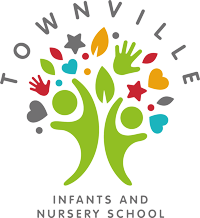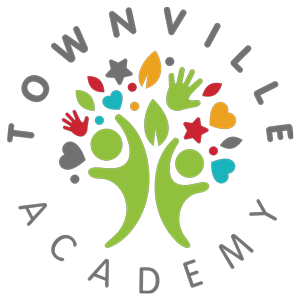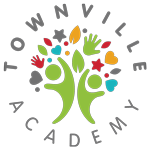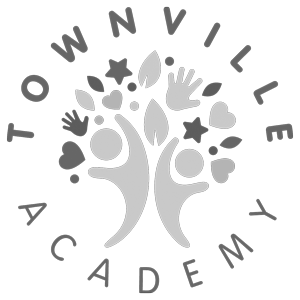Reading – curriculum information
Intent
At Townville Infant and Nursery School, we aspire to offer the best possible early education for all our children in a happy, safe, inclusive environment. Through our reading curriculum we aim to ensure our children:
- Apply phonic knowledge and skills as the route to decode words until automatic decoding has become embedded and reading is fluent.
- Read common exception words on sight.
- Read books aloud, accurately, that are consistent with their developing phonic knowledge.
- Re-read books to build up their fluency and confidence in word
- Understand and discuss both what they read and what is read to them by predicting, summarising, inferring and asking and answering questions.
- Become familiar with key stories, fairy stories and traditional tales. Learn to appreciate rhymes and poems, and recite some by ear.
- Develop positive attitudes and stamina towards reading.
- Value reading as both a pleasurable activity and one which enables them to acquire new knowledge.
- Enjoy sharing books with others.
Our Key Stage One curriculum builds upon children’s learning in the EYFS ensuring full coverage of National Curriculum. They will leave Townville Infants with the fundamental skills needed to continue their reading development in KS2 and beyond.
Implementation
Reading is a Priority
At Townville Infants, reading is a priority because we recognise that developing both the skills of reading and a love of reading, ensure a world of opportunity for our children.
Reading is essential to access not just the primary school curriculum, but is also preparation for learning at secondary school. As a skill necessary for life-long learning, it provides endless possibilities and opportunities for improvement and as a pleasure it feeds imaginations and takes us to people and places that we can only dream about.
The teaching of reading at our school, is based on the five essential components needed to develop fluent, confident readers.
- Phonemic awareness – the ability to hear, identify, move or change sounds (phonemes), in spoken words
- Phonics – recognising the link between sounds (phonemes) and letters (graphemes) to decode words
- Fluency – the ability to read accurately, quickly and with expression
- Vocabulary – knowing the meaning of words to help in order to understand what they are reading
- Comprehension – understanding and interpreting what they have read.
The use of Read, Write Inc in the Early Years and KS1 provides a rigorous and systematic approach to the teaching of reading based on synthetic phonics, which research shows to be the most effective approach to the teaching of reading.
Alongside the teaching of phonics, children in Early Years have a ‘Talk Through Stories’ session and KS1 have whole class, weekly ‘shared reading and guided reading’ session to develop vocabulary and comprehension. (see the document below for more information)
In addition, each child is heard read on a 1:1 basis at least once a week, KS1 class have daily story time and each class has the opportunity to visit the school library.
Phonics from the start
Phonics teaching starts with our youngest learners in nursery. In reception, the teaching of phonics starts in Week 1 with the children learning Set 1 sounds from the Read Write Inc. systematic programme. Sounds are taught in a set order and regular assessment informs groupings and interventions.
For more information regarding phonics at Townville, please look at the phonics section of the curriculum.
Programme and Progress
At Townville Infants, we use the Read Write Inc (RWI) programme to get children off to a flying start with Reading. RWI is a phonic based approach to teaching reading. It involves children learning to read sounds and how to blend them together to read words through a successful reading programme that enables every child to become a confident and fluent reader. It aims to teach all children to read at a pace that they are comfortable with. In the first instance, children learn 44 sounds (speed sounds). There are the letter sounds and not letter names, and they then learn to blend these sounds together to make words. After they are confidently able to read words with these 44 sounds, they will then learn alternative ways of making sounds too (i.e. ay, a-e, ai). See the document below for the progression
During the phonics/reading session, the children read phonic books that are closely matched to their increasing knowledge of phonics and ‘tricky’ words and, as children re-read the stories, their fluency increases.
Keep up, not Catch up
Children’s progress is regularly monitored through half-termly assessments with the Read Write Inc. leader. On occasions, this can be done more regular. Children are grouped into phonics groups depending on their ‘stage and not age’ to allow them to work at their level. Children who are not making expected progress are identified and intervention sessions are put in place to ensure they make progress. Children who are identified as being in the lowest 20% for reading are prioritised for regular 1:1 reading, focusing on their particular needs.
Early Reading Expertise
Our Read Write Inc, ‘reading leader’ is working closely with Read Write Inc trainers and carries out weekly training and practice sessions for all staff, including support staff and sets up CPD when required. Our reading leader regularly monitors the delivery of phonics and reading and provides support if necessary. Townville Infants, have just graduated from the Outwood English Hub but continue to access their development days and work on their advice.
Books match sounds
To ensure children have sufficient practice of the reading skills taught through the rigorous RWI programme, they access home reading books in the Early Years and KS1 which closely match the phonics stage individual to the child.
Children in the Early Years and KS1 are given 2 reading books to take home. These are:
‘Read Write Inc’ – this book matches their phonics stage. The book is read in their phonics sessions and then taken home to read each day to develop fluency. The children access this book for either three days or one week to ensure they are given, sufficient practice to read, re-read and retell stories whilst embedding their phonic knowledge and reading fluency. By the end of their time with the book we would expect that each child would be able to read the book fluently and apply their phonic knowledge independently.
Home Reading – this book provides children with the opportunity to develop their fluency. This book will be matched to your child’s phonics ability. It builds upon the ideas and many of the words in the Storybook he or she has read in school. Your child may need some support in reading this book.
Promoting a love of reading
We aim to develop a love for reading at Townville Infants.
- Each class has a class story, this is read to them daily and it is made a priority to share this story each day.
- Our daily English lessons are inspired by a text and we ensure we look at a range of inspiring fiction, non-fiction and poetry texts to expose children to new and different texts that they might enjoy.
- We celebrate World book day in style! We have had dress up days, stay and read sessions, quizzes and we have invited parents in to complete activities with us. Watch this space to see what we are doing this year.
- We have a book swap where children can bring their once loved books and swap them with new, exciting and expiring books as no cost. We even have one for the adults too.
- Children have access to the school library to choose their own book; we feel this is extremely important as this allow children to choose books that they want to read, therefore, promoting a love of reading.
- Each Monday morning parents are invited into school to share books with us.
- We will continue to organise events that will enthuse and inspire, such as author visits.
- Our latest and very exciting initiative we have introduced to develop children’s enthusiasm for reading is our 20 Read Reward.
Further information
If you would like further information on School Gateway, please call into the office or call us on 01977 554185.
Alongside your child’s phonics book which they need to read every night, your child will bring home an additional reading book. This needs to be read by your child at least three times per week at home. Both books should be brought into school every day, to ensure that it is ready to practise at school.
Every time your child reads at home, don’t forget to log it on Marvellous Me for their count to 20 reads. If your child is just starting school and does not have a book yet, practise their sounds instead, this also counts towards their 20 reads.
Remember 20 reads a half term and your child will get their class reading reward at the end of the half term.
‘The teachers seem to genuinely care about the children and their safety and encourage them to do well.’
‘My son seems to have developed exponentially.’
‘I have received great feedback and communication about my son from his teacher since starting Townville.’
‘How open and approachable the teachers and headteacher are. Very positive and forward-thinking attitudes.’
‘Professional staff who work in partnership with us to provide the best for our children’s development.’
‘The school is driven and led by the pupils’ best interests. I also like the location of the school.’
‘That anything you need to know an answer to the reception are most helpful.’
‘Good communication via the Marvellous Me app.’
‘It’s community spirit and welcome feel.’
‘My child loves going to school.’
‘The effort they put in to each child personally.’
‘My child likes the teachers.’
‘My childs best interests of learning have always been put first and the support has been great.’
‘Great school with lovely teachers who really care about the children. Good range of after school clubs.’
‘I feel like my children are treated as individuals.’
‘The headteacher shows strong leadership and provides a clear direction for the school’s future.’
‘It’s a small school makes everything a lot more personal.’
‘My child loves it there he loves all his new friends and the teachers.’
‘My daughter isn’t simply a number like she would be in a larger school.’
‘The school encourages children to achieve their full potential.’
‘Made friends at school, little parties and activities you do for the children.’




